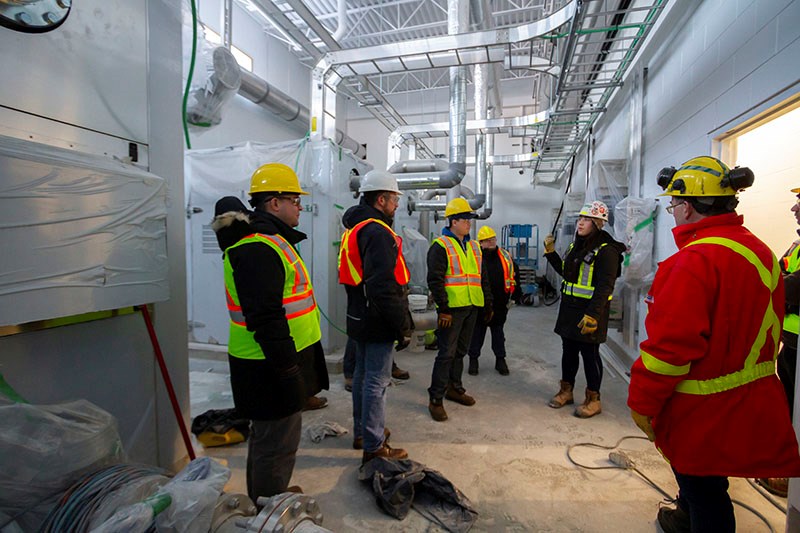The majority of processing equipment is now in place at Thompson’s new wastewater treatment plant, and commissioning of the plant is scheduled to take place at the end of April.
However, the city says, construction delays will not result in any additional construction costs.
“The plant site feels like another world compared to when I first visited the site in 2017,” said Mayor Colleen Smook in a city press release Feb. 4. “We’re excited to celebrate the commissioning of the plant this spring, and the commitment to preserving our environment that it represents.”
Smook and council toured the construction site Jan. 23.
The majority of the concrete foundation pouring was finished last June, a little behind the target date of mid-May that Sibal Basu of design engineer Stantec, which also provides contract administration services, estimated it would be finished when he addressed council last February.
Unlike many sewage treatment plants elsewhere, this one will have closed tanks, which will save construction costs because the building housing offices and operational machinery can be built on top of the tank instead of another foundation being constructed beside the tanks.
Basu said last Feb. 26 that delays would not increase the project's cost because it is a lump-sum price contract and that, if the project is not substantially complete by the agreed upon date, the city, Stantec and the Manitoba Water Services Board could choose to enact a penalty clause for every day the project falls behind schedule.
Previously, it had been estimated that commissioning (when the plant starts receiving water) could begin by January of this year, with substantial completion of the sewage treatment plant having been hoped for by this spring.
The city’s one-third share of the plants construction costs, estimated at around $36 million, will be be paid for by a combination of frontage fees and water rate riders for 25 years. A rate rider proposed to be 58 cents per cubic metre of water that utility customers consume will be charged over that quarter-century to cover 75 per cent of the costs, with the other quarter coming from an estimated frontage fee of 81 cents per foot, which can be paid over the 25 years or in a one-time lump-sum payment up front. Under the plan, the average residential property will be charged an estimated $110.71 a year as a result of the water rate rider and $43.90 for frontage, the city said in November 2016, creating a total annual water and wastewater bill increase of $154.61. The average one-time payment for a residential home is estimated at $563.06.
The estimated cost to the city to pay back debentures taken out to fund the project will be a bit less than $1 million per year.
A previous plant to pay back the city’s $12 million share of construction costs through most residential property owners (who represent about 3,800 of approximately 4,000 metered connections) paying either a one-time payment of $1,625.52 or $127.16 annually for 25 years was rejected by the Municipal Board because payments were based on the size of property’s water meters, which meant that those with five-inch meters, the largest in the city, would have paid $276,338.01 up front or $21,617.02 for 25 years.
The city had told the Municipal Board during a public hearing in Thompson in June 2016 that it had chosen a local improvement bylaw to fund its share of the sewage treatment plant because paying back the borrowed money through property taxation would mean non-taxable properties connected to the water system bore none of the costs and that repaying the debt through higher water and sewer rates wouldn’t result in guaranteed annual revenues because water consumption has dropped every year since the pay-per-use system was implemented in 2011.




